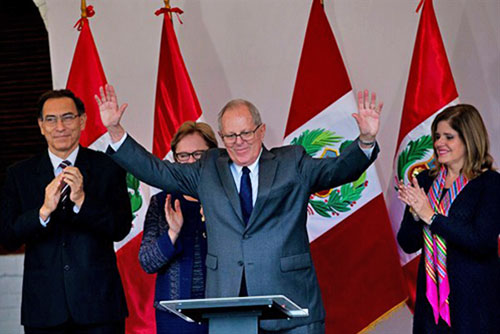|
June 14, 2016 from WorldPoliticsReview Website
at the end of a news conference, Lima, June 9, 2016 (AP photo by Silvia Izquierdo).
After trailing Keiko Fujimori in
the polls for weeks, former World Bank economist and investment
banker Pedro Pablo Kuczynski enjoyed a surge of support just
before Peru's run-off election on June 5 (2016) to win one of the
most contested presidential races in the country's history.
But the greatest obstacle Kuczynski
faces may be the fact that Fujimori's party holds a majority of
seats in Peru's Congress.
Kuczynski won 50.12 percent of the more
than 17 million ballots cast, while Fujimori won 49.88 percent, with
a
difference of just 42,597 votes.
He is now in jail in Lima for crimes
that include authorizing kidnappings and death squads.
Despite running a lackluster campaign,
the 77-year-old Kuczynski benefited from the
disqualification of two other candidates,
ample support from the media and political leaders, and a virulent
anti-Fujimori campaign.
While Kuczynski is technically capable and may have good policies, the effectiveness of his administration will hinge on its ability to negotiate with Fujimori's party.
Kuczynski may seem like an odd leader for a country where more than 80 percent of the citizens are indigenous or mestizo (mixed race).
The son of European Jews who moved to Peru during the rise of Nazi Germany, he lived much of his adult life in the United States and held U.S. citizenship until last year, when he renounced it in response to criticism in Peru that he was a "gringo."
His mother was a literature professor, and his father was a doctor who specialized in tropical diseases and worked all over the world, before running a leper colony in the Peruvian Amazon and taking a job at the Ministry of Health in Lima.
Kuczynski spent much of his youth
in Lima, but also lived for several years in his mother's native
Switzerland and at a boarding school in England. He attended both
Oxford and Princeton on scholarships, earning a master's in public
administration from Princeton.
He worked at the World Bank in several capacities, held management positions in investment banks and a mining company, and co-founded a private equity firm that has made major investments in Latin America.
He has also served in several Peruvian governments, first in the management of the country's Central Bank, then as minister of energy and mines and, more recently, as minister of economy and finance and chief of staff in former President Alejandro Toledo's administration in the 2000s.
He made an earlier, unsuccessful
run for president in 2011.
Kuczynski founded a nonprofit organization called Agua Limpia that helps poor communities build potable water and sanitation systems.
Webb, who worked with Kuczynski at Peru's Central Bank and the World Bank, describes him as "even-tempered and very, very bright."
But Kuczynski will nevertheless be
handicapped by the fact that his party won only 18 of the 130 seats
in Peru's Congress during the first round of voting, while
Fujimori's party, Fuerza Popular (Popular Force), holds more
than 70 seats.
But as Tanaka, notes,
He explains that while Kuczynski is technically capable and may have good policies, the effectiveness of his administration will hinge on its ability to negotiate.
This includes the administration's
relations with regional governments, which have halted mines and
other large projects in recent years.
Kuczynski has apologized for
insulting Fujimori during the campaign and says he wants to meet
with her before his July inauguration.
Tanaka predicts that her party will cooperate with the incoming administration in its first years, when the majority of voters are likely to support it.
But when the electorate grows impatient and public support for Kuczynski withers, as it has for the last few presidents, Fujimori's party is likely to assume a more critical opposition.
Even though Kuczynski won the
election, in office he may still be hindered by Fujimori's political
ambitions.
|


